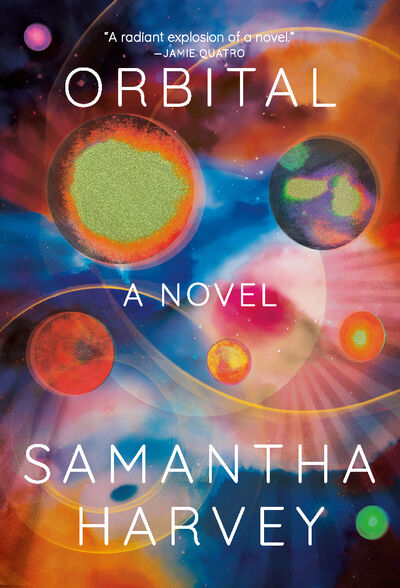Far Above The Clouds
Orbital
By Samantha Harvey

20 Feb, 2025
Samantha Harvey’s 2023 Booker-winning Orbital is a stand-alone science fiction novel.
The Internation Space Station orbits slightly over 400 kilometers1 above the Earth. What is a day in the life of its crew like?
There are six crew aboard the ISS: Russians Anton and Roman, Japan’s Chie, Italy’s Pietro, Britain’s Nell, and American Shaun. The crew is a mix of veterans and comparative newbies. Each of them has one or more specialty.
Terrestrial divisions are reflected on board the ISS. The primary example is the toilets: Russia demands a fee for non-Russians to use their toilet, forcing all non-Russians to use the American, technologically superior, toilet. For the crew, this is a matter of humour, not deadly seriousness.
There are routine on-board duties to manage. Chie has to deal with the personal tragedy of a death in the family. There is the distraction of the upcoming American Moon mission2. There are the usual terrestrial affairs to keep an eye on, not least a typhoon sweeping towards Indonesia and the Philippines. Add them up, and you get another day on the ISS.
~oOo~
Yeah, more literature. Just that sort of week, I guess.
If anyone out there is looking for a nice example of the difference between events and plot, consider this novel. Stuff happens, in the same way stuff happens every day, but like the ISS itself, there’s no ultimate destination3.
Orbital is poorly suited for my usual approach to reviewing. I seriously considered setting it aside to review something else. However, there was a section that compelled me to review the book, just so I could quote this passage:
If only politics really were a pantomime. If politics were just a farcical, inane, at times insane entertainment provided by characters who for the most part have got where they are, not by being in any way revolutionary or percipient or wise in their views, but by being louder, bigger, more ostentatious, more unscrupulously wanting of the play of power than those around them, if that were the beginning and end of the story it would not be so bad. Instead, they come to see that it’s not a pantomime, or it’s not just that. It’s a force so great that it has shaped every single thing on the surface of the earth that they had thought, from here, so human-proof.
[…]
The planet is shaped by the sheer amazing force of human want, which has changed everything, the forests, the poles, the reservoirs, the glaciers, the rivers, the seas, the mountains, the coastlines, the skies, a planet contoured and landscaped by want.
For the most part, the novel feels almost detached, so the sudden veer in why politics isn’t a joke or a game, but something that matters, is a glass of cold water to the face4.
That elided material ([…]) is a firehose of description, which is typical of the novel. Not much happens, but everything is described in vivid, hyper-focused detail. Reading this book is like double-fisting Modafinil5 before donning brand-new glasses and discovering that trees have leaves, not just blurs.
By approaching it as a mundane activity, the author moves space exploration from the stuff of heroes and adventures to the everyday. The intention isn’t negative. Just the opposite. Orbital is a short love letter to space, to crewed space missions in particular.
Despite setbacks and all the inefficiencies inherent in any human activity, Harvey still has the greatest enthusiasm and confidence in crewed spaceflight. If you read her novel, you might as well.
Orbital is available here (Grove Press), here (Barnes & Noble), here (Bookshop US), here (Bookshop UK), here (Chapters-Indigo), and here (Words Worth Books).
1: Units corrected from the original miles, feet, and so on. As a Canadian of a certain age, I am adept at doing that. Using feet and miles and such in space is how spacecraft end up lithobraking on Mars. I am a little boggled that Harvey opted for the units she did, as she is English and the UK uses metric. Did the UK edition use metric?
2: There does not seem to be a path from our 2025 to whenever this is set. It’s best to approach it as an alternate history novel, where the branch point was before 2024. Possibly before 2016.
3: The ISS will eventually deorbit, so in a sense that’s its destination. Not in this book, though.
4: What came to mind, and I bet I am the first one to make this comparison, is the scene in Parenthood in which Keanu Reaves’ stoner slacker suddenly launches into a passionate diatribe about parenting before relapsing into a cognitive dial tone.
5: When I was prescribed Modafinil, the package recommended one to four tablets a day. The median of one to four is two and a half, so I played it safe, took two, and then headed off to a shift I spent breaking the sound barrier as I strolled down halls, and speaking in frequencies only dogs could hear. The experience was not ideal, especially as this was the evening when I had to deal with a particularly obstructive parking enforcement official.
